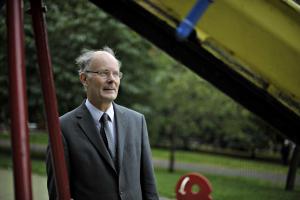
SUPPORT for an independent Scotland has reached its highest-ever level in a major survey which identifies long-term changes in people’s social attitudes.
The latest publication of the British Social Attitudes (BSA) survey shows more than half of people north of the Border think Scotland should be an independent nation.
It is the highest figure recorded since 1999 when a question of how Scotland should be governed was included for the first time.
In that year – when the Scottish Parliament was officially opened – support for independence was at 27%, while 59% backed devolution and 10% said they believed Holyrood should not exist.
The new figures, based on a survey carried out in 2021, show that 52% back independence, while support for devolution has dropped to 38%. Just 8% now think there should be no Scottish Parliament.
However, the report, published today, also shows the changing attitudes toward the constitution are not unique to Scotland.
For the first time, in Northern Ireland, support for being part of the UK has slipped to slightly below half at 49%, while support in Northern Ireland for Irish reunification has increased from 14% in 2015 to 30% now.
Experts at the National Centre for Social Research (NatCen), which carries out the survey, said the results show how Brexit has created divisions about the governance of the UK that go beyond Scotland – and the new UK Government is facing a “particularly formidable challenge” in bringing the Union together.
Sir John Curtice, senior research fellow at NatCen, said the question on independence has been included in the Scottish Social Attitudes survey – a parallel study to the BSA – every year since 1999.
“This is not asking if Scotland should be an independent country yes or no, it is this long-term question, and the point about that, therefore, is we can show how attitudes have shifted over a long time period,” he said.
“The 52% is as high as it has been on that question.”
The BSA report noted: “Since 2014, there has been a marked increase in the level of support for independence, and especially so since the EU referendum of 2016, after which leaving the UK became more popular than devolution for the first time.
“Against this backdrop, it is perhaps not surprising that Scotland’s constitutional status should have become an issue of lively debate once more.
“The Union has certainly become decidedly less popular north of the Border.”
The survey shows 82% of SNP supporters now back independence, up from 51% in 2012, while the proportion of Conservative identifiers who do so has hardly changed, remaining at 5%.
Curtice said the report demonstrated how attitudes towards independence have become more polarised over the years.
“The immediate political angle in this is that actually, Nicola Sturgeon doesn’t have to tell anyone that an election is about the constitutional question – as that is what people are primarily choosing their parties on,” he said.
“Why has this happened? It has happened essentially because of Brexit.”
But he also pointed out this is not a trend unique to Scotland, with a similar pattern happening in Northern Ireland.
Nearly two-thirds – 65% – of remainers in Scotland now back Scottish independence, up from 44% in 2016.
In 2016, 64% of people in Northern Ireland who voted remain were in favour of being part of the UK, but now only 37% are.
The report said there is now “a sharp division” on the constitutional question between the supporters of Northern Ireland’s nationalist and Unionist parties.
“On one end of the spectrum are supporters of the DUP, over nine in 10 of whom want Northern Ireland to remain in the UK. On the other, nearly eight in ten of those who support Sinn Fein believe it should leave,” it stated.
Curtice added: “You might have thought Northern Ireland was always polarised on the constitutional question, but actually it wasn’t.
“It is now more polarised on the constitutional question, and again this has happened because of Brexit – because, of course, in Northern Ireland, virtually everyone in the nationalist community voted to remain and something like 80% of Sinn Fein supporters are remain supporters.
“You can do this analysis for virtually all of the issues about the British constitution. So there is a wider process going on here.”
He added: “The fact that half the people in Scotland might want to leave the United Kingdom does pose the United Kingdom a bit of an existential challenge.
“The point is what has been happening in Scotland is not unique to Scotland, and in a sense, shows it is part of a wider story which shows how Brexit has created divisions about the governance of the UK that go beyond Scotland.”
Curtice said the new UK Government now faces a “particularly formidable challenge” in bringing the Union together, with the question of being in Europe as important as being in the UK.

He added: “In the case of Ireland, it has always been the case of is it the UK state or the Irish state – but now the point is the Irish state is inside the EU, and the UK is not inside the EU.
“And in the case of Scotland, when it gets around to having a referendum debate, this is what it is going to be about. It isn’t going to be simply about – like it was in 2014 – whether you are inside or outside the UK, with various claims being made about what were the implications of this for Scotland’s EU membership.
“We are now having a debate about which union you would prefer to be a member of.”
SNP depute leader Keith Brown said: “This is the highest-ever support for independence in this series of authoritative surveys. Becoming independent means never again will Scotland suffer the damage of Westminster Tory governments people here don’t vote for.
“Because of Westminster control over Scotland, we are subject to a Tory party moving ever more to the right – apparently planning to scrap the cap on bankers’ bonuses while the vast majority of people take a hit to their living standards because of Brexit.
“Independent European countries similar to Scotland are wealthier and fairer than the UK, so why not Scotland?”
The report also highlighted concerns about the health service, with around a quarter of people in Scotland (24%) and England (26%) saying they did not get the medical treatment they needed during the past 12 months due to long waiting lists.
Nearly two-thirds – 63% – of people living in Scotland said they were confident of receiving the best treatment available if they became seriously ill, compared with 56% in England.
Brown added: “The findings on the NHS show that, despite the huge challenges posed by the pandemic, people across Scotland have more confidence in the health service here than their counterparts in Tory-run England.”







